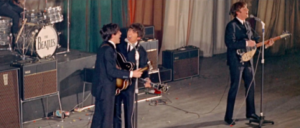 Before going to see Ron Howard’s new documentary, The Beatles: Eight Days a Week I had to wonder what more could be said at this point about the most famous and influential rock and roll band ever. Now in the interest of full disclosure I must tell you that I’m a lifelong Beatles fan—their recording career coincided with my childhood from the ages of 8 through 14. I think it’s difficult for most people who weren’t alive or aware during that period to grasp the enormity of their popularity at the time, and the effect of their music on young people and how we thought about life. Howard’s film covers the band’s touring years, from 1963 to ’66, which ironically isn’t as influential musically nowadays as their later period starting with Sgt. Pepper. The beauty of this approach is that we get to watch and listen to a lot of rare concert footage that brings home again how very tight a band they really were.
Before going to see Ron Howard’s new documentary, The Beatles: Eight Days a Week I had to wonder what more could be said at this point about the most famous and influential rock and roll band ever. Now in the interest of full disclosure I must tell you that I’m a lifelong Beatles fan—their recording career coincided with my childhood from the ages of 8 through 14. I think it’s difficult for most people who weren’t alive or aware during that period to grasp the enormity of their popularity at the time, and the effect of their music on young people and how we thought about life. Howard’s film covers the band’s touring years, from 1963 to ’66, which ironically isn’t as influential musically nowadays as their later period starting with Sgt. Pepper. The beauty of this approach is that we get to watch and listen to a lot of rare concert footage that brings home again how very tight a band they really were.
The picture features interviews with Paul McCartney and Ringo Starr, along with clips of interviews with the late John Lennon and George Harrison. But Howard also used crowd-sourcing to uncover some new voices, and a lot of footage shot by Beatles fans and others over the years that hasn’t been seen before, and the result is a vivid record of the excitement, the special feeling of that time, from the point of view of a lot of ordinary folks who lived through it. The first aspect one remembers, of course, are the thousands and thousands of screaming girls at the shows and everywhere the Beatles appeared. It mystified and scared a lot of adults at the time—it had happened before with other stars like Sinatra and Elvis, but never on this huge of a scale. Police had serious trouble handling the crowds. It’s clear now that the Beatles suddenly broke through a heavy sexual repression that was a condition of teenage life, and had been building up for years in the 50s. The looks and personalities, and of course the long hair of the four lads were unusual, but that doesn’t really explain it. It was the music that mattered most.
In the film when we see the Beatles in concert early on singing “She Loves You” or “Twist and Shout” or any number of other hits, you really get how this bold new style could create such a physical sensation. You might even get chills now just watching it, and when, for instance, the boys would sing “Wooo!” in their choruses, the audience’s screaming would just explode. And I understand this now. The music was so free and powerful, especially compared to the very tame stuff that passed for most popular music at the time.
The film explores some interesting sidelights of the Beatles’ grueling concert schedule (over 800 shows in only three years, in 15 countries). The most moving for me was the band’s refusal to play at a segregated stadium show in Florida. The stadium had to give in, and didn’t segregate, and we hear from a black woman who went as a girl and experienced a sense of racial unity for the first time in her life. This also led to other integrated shows throughout the South.
The Beatles eventually burned out on touring, and we’re shown the unbelievable pressure and exhaustion that led to that wise decision. Fame at that level can really take a toll. Skeptics kept saying that the Beatles’ popularity would fade away, but of course they were wrong. The Beatles: Eight Days a Week, the Touring Years is as close as we’ll get to re-experiencing that once in a lifetime thrill ride. And we’ll always have the music.

